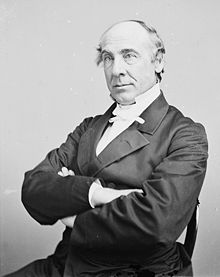United States Sanitary Commission
The United States Sanitary Commission (USSC) was an institution of the United States government that existed from 1861 to 1866 , which supported and coordinated the relief activities of volunteers during the American Civil War . The impetus for the foundation was a meeting of women from influential and wealthy families of American society as well as members of various already existing aid organizations in New York in April 1861. The official foundation took place after the signing of a corresponding law on June 18 of the same year then President Abraham Lincoln . At that time, however, he was not convinced of the usefulness of such a device and called it the “fifth wheel on the car”.
Organization and development
Henry Whitney Bellows was appointed President of the United States Sanitary Commission after it was founded , Frederick Law Olmsted acted as Secretary General. The USSC was divided into the areas of Preventive Service (preventive measures), General Relief (general aid) and Special Relief (special aid). Her work initially met with skepticism, ignorance and rejection from the government as well as from the army and from doctors active in the war. This was in large part due to the fact that the USSC was predominantly women who organized themselves into thousands of local Relief Society across the country. Despite its official character, there was almost no financial support from the government, but the treasurer George Templeton Strong managed to raise private donations of around five million dollars during the war.
After the end of the war, the USSC assisted war veterans in returning home and asserting financial claims. In May 1866 the United States Sanitary Commission was dissolved. The assets existing at this time were used entirely to purchase government bonds, the interest income from which supported war veterans and their families. It is estimated that by the time it was disbanded, the USSC had raised a total of approximately $ 20 million to $ 25 million in donations in cash and in kind, and that its activities halved the disease rate in the Northern Army.
activities

The work of the USSC mainly consisted of fundraising, often through the sale of handcrafted goods and baked goods that it had made at so-called sanitary fairs , the operation of field kitchens, the production and distribution of bandages as well as socks, gloves and other clothing, and working as nurses on the battlefields and in the hospitals . The USSC auxiliary staff also inspected the living and working conditions in the hospitals and coordinated the recruitment and employment of qualified auxiliary personnel. Working for the USSC enabled the women involved to gain experience in the area of administrative activities that would be of advantage to them after the end of the war when they started working in the economic and government sectors. The work of the USSC thus had an impact on attitudes about the role of women in American society beyond the war.
Despite its rapid expansion, widespread support at the local level, and its successes, there was also resistance to the USSC and criticism of its work. Some local aid organizations insisted on their independence as well as on relief operations on site and thus opposed the efforts of the USSC to integrate them into their activities. Particularly when it comes to organizing the supplies for the soldiers, the USSC favored the collection and distribution of relief supplies on a national level in order to achieve equal treatment of all units as far as possible. In addition, the USSC's practice of only admitting trained nurses to the relief effort met with criticism, as some local aid organizations and part of the population believed that the soldiers' family members would be better suited to providing assistance. The Christian Commission , a national Christian aid organization, requested the distribution of religious scriptures along with relief supplies. The rejection of this request by the USSC led to conflicts with the Christian Commission.
literature
- Judith Ann Giesberg: Civil War Sisterhood: The US Sanitary Commission and Women's Politics in Transition. University Press of New England, Lebanon NH 2006, ISBN 1-55-553658-1
Individual evidence
- ^ Great Central Fair Buildings, Philadelphia . July 1864. Retrieved July 28, 2013.
Web links
- United States Sanitary Commission (English)
